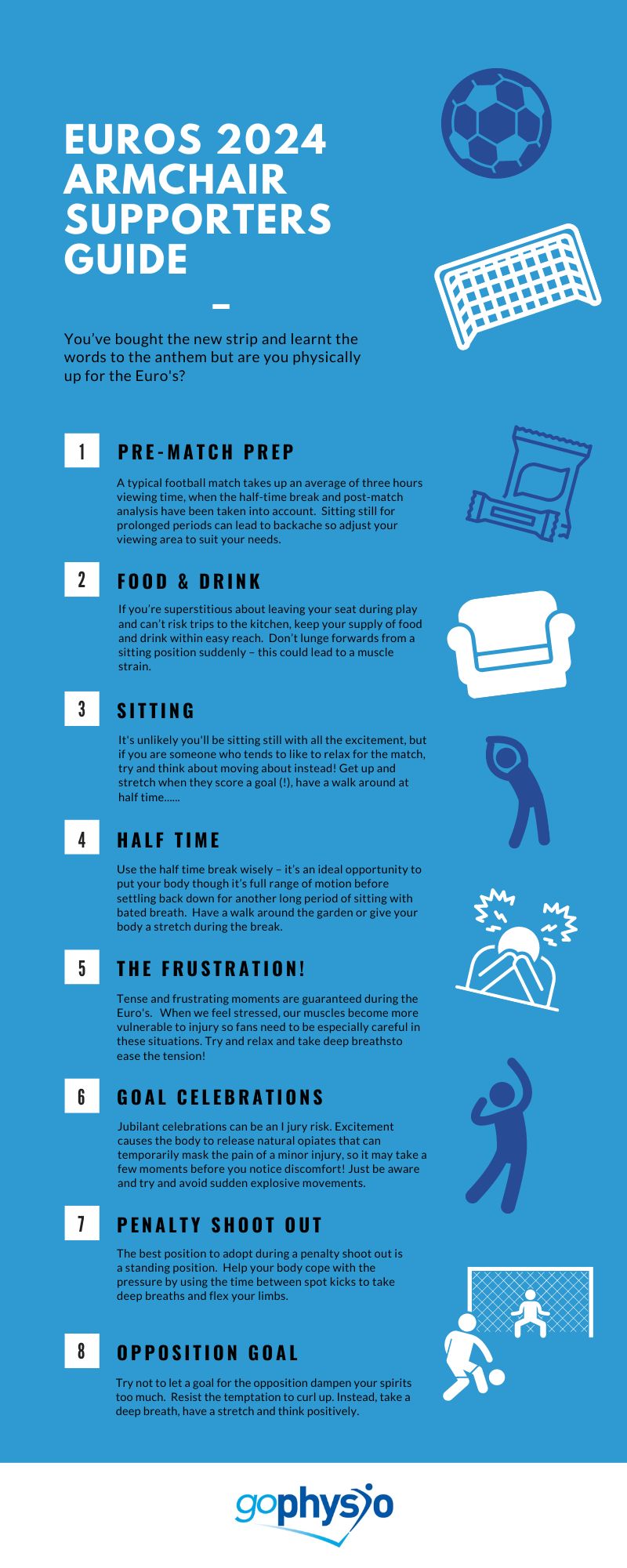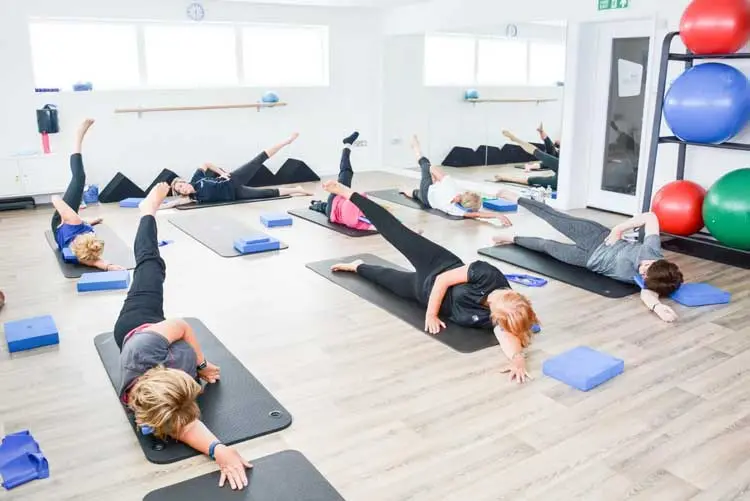You’ve followed Gareth Southgate’s plans, watched the matches on tenterhooks so far and have got the flags out! But are you physically ready for the Euro’s 2024 Final on Sunday?!
With the Euro finals just days away, we are helping football fans support Southgate’s heroes safely from their sofas.
A ‘must read’ for all armchair supporters, we’ll help ensure that even the most over-enthusiastic spectators don’t need to be stretchered off mid-match!
Euro’s Fan’s Survival Guide
Pre-match prep
A typical football match takes up an average of three hours viewing time when the half-time break and post-match analysis have been taken into account. Sitting still for prolonged periods isn’t great, so adjust your viewing area to suit your needs.
- Food and drink If you’re superstitious about leaving your seat during play and can’t risk trips to the kitchen, keep your supply of food and drink within easy reach. If you put it just out of reach in the same room, this is a great way to help make sure you move about a bit during the match!
- Television Try and make sure your TV is straight ahead of you and at eye level so that you don’t have to crane or twist your neck while watching a long game.
- Seating Reinforce the support your sofa provides by placing some cushions or a rolled up towel behind the small of your back. This will help support the natural curve in your spine and relieve any tension.
- Posture Change your viewing posture often. Have a few options – sofa, dining chair, cushions on the floor or bean bags are all great. You can even try lying down on the floor, standing up or pacing about. Just try and avoid being slumped in an unsupported sofa without moving for 3 hours!
Kick off: boring nil-nil
While we wait for the players to work their magic, it’s easy to slump and slouch in our seats. This puts undue stresses and strains on the neck and back, which causes muscles, ligaments, discs and tendons to compress. This condition is sometimes called ‘creep’ and could eventually lead to long-term discomfort.
- You can avoid pain creeping up on you by being aware of your posture. Try and move and change position regularly.
- You can sit up straight as if you’re willing England to score. Aim to keep your head and neck in the midline position (symmetrical) to avoid unnecessary stress on other areas of the body.
- If you’re feeling stiff, try a few shoulder shrugs or spinal twists to loosen up. Look at the exercises below for some ideas.
Half time
Use the half time break wisely – it’s an ideal opportunity to put your body though it’s full range of motion before settling back down for another long period of sitting. Try the simple stretches below:
- Quadriceps – In standing position, with your feet together, bend your left knee and reach round with your left hand to your left foot. Gently pull your left foot towards your left buttock; try to keep your knees together. Go as far as is comfortable and you should feel the stretch along your left thigh. Squeeze your buttocks to further stretch the thigh muscle. Hold for 30 seconds then relax. Repeat with right leg.
- Hamstrings – In standing positions, place your left foot in front of you and keep your heel on the floor. Keep the left knee straight and allow the right knee to bend slightly. With your hands placed on your right thigh, lean forward and look straight ahead. Feel the stretch along the back of your thigh. Hold for 30 seconds then relax. Repeat with right leg.
- Calves (gastrocnemius and soleus) – In standing position, place your left foot about six inches behind your right foot – keeping both feet at 12 o’clock. With feet flat on the floor, lean forward and transfer your weight to your front leg so that you feel the stretch on your left calf muscle. Hold for 30 seconds then relax. Repeat with right leg.
- Shoulders – Start by raising both shoulders towards your ears and breathe in slowly. Hold this shrug position for 10 seconds, then allow your shoulders to relax and lower. Repeat three times.
Frustration!
Tense and frustrating moments are guaranteed during the most football matches and I’m sure the Euro finals will be no different. When we feel stressed, our muscles become more vulnerable to injury so fans need to be especially careful in these situations.
- Try to avoid sudden jerking movements, which could give you a cricked neck.
- When protesting about a bad tackle, resist the urge to flail your arms around. This type of movement can cause upper body strains.
- To vent your anger at the referee, it is often safer to take a deep breath, stand up and stamp your foot.
- Excessive stress can cause muscles to spasm and makes areas of the body already affected by injury more susceptible to further damage. Counter this by performing a couple of tension busting exercises. Try gently moving your neck from side to side and then slowly rotate your shoulders.
Goal celebrations
Jubilant celebrations are a major cause of injuries among football fans. Excitement causes the body to release natural opiates that can temporarily mask the pain of a minor injury, so it may take a few moments before you notice discomfort!
- The key to avoiding injury is to be prepared!
- In situations where you can reasonably anticipate a goal (England are awarded a penalty) prepare your body by getting up off the sofa carefully. You are less likely to become injured if you begin your celebrations from a standing position.
- If an England goal comes as a total surprise, do your best not to shock your body too much. Sudden explosive movement can be risky when you leap off the sofa after a long period spent sitting down.
Penalty shoot-out
The penalty shoot-out is one of the riskiest situations a football fan will have to face during the Euro’s. Suspense is guaranteed so fans should follow the advice in ‘frustration’ to manage their nerves.
- As each player walks up to the spot, remind yourself that your suspense will either turn to jubilation or frustration so be prepared for all eventualities.
- The safest position to adopt during a penalty shoot out is a standing position. Help your body cope with the pressure by using the time between spot kicks to take deep breaths and stretch your limbs.
Goal for opposition
See ‘frustration’ but also bear the following points in mind.
- Try not to let a goal for the opposition dampen your spirits too much. Resist the temptation to curl up. Instead, use this as an opportunity to change your posture.
- Plump up your cushions so that you are well supported, able to sit up straight and ready to will England on to victory!
But seriously folks….
The content of this article is intended to be light-hearted and fun but there is a serious side too. Matches like the Euro finals can be pretty stressful and take their toll mentally and physically. Also bear in mind that drinking alcohol can diminish your ability to recognise pain.
Most of all, enjoy the match!
It’s easy to get caught up in the tension and excitement and forget about the pressures we’re putting on our bodies. This makes us far more likely to pick up or aggravate an existing problem. The good news is that most injuries are preventable. By taking note of how to safely celebrate a goal, remonstrate with the ref and survive a penalty shoot-out, fans should make it all the way to the end of the final fighting fit!”




